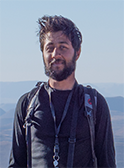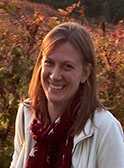
- About
- Funding
- Research
- Wright Center
- News & Events
Back to Top Nav
Back to Top Nav
Back to Top Nav
The Neukom Fellows Program launched in 2012. Fellows have two-year appointments and for their interdisciplinary work which has a computational theme, are co-sponsored and mentored by faculty in at least two departments or programs. Fellows teach one course in each year of their residency. The 2019 Neukom Fellows with their Ph.D. granting institutions and departmental affiliations are given below, along with descriptions from the Fellows of their research plans.
Earth Sciences and Mathematics; Mentors - Justin Strauss, C. Brenhin Keller and Anne Gelb (Ph.D. expected 2019)

Akshay Mehra research centers on discovering spatial relationships that reveal form, architecture, and organization to illuminate function at multiple scales. At Princeton, he has largely focused on using serial grinding and machine learning to produce and analyze three-dimensional models of the earliest biomineralizing (shell-building) animals. As a Neukom Fellow, Akshay will study ancient microbial constructions to understand how environment and biological processes lead to the varied morphologies that are preserved in the rock record. Prior to starting his graduate studies, Akshay was a researcher at Situ Studio, where he primarily worked on projects involving human rights violations. Akshay holds a Bachelor of Architecture from Cornell University.
Geography and Geisel; Mentors- Jonathan Chipman, Lisa Adams, Margaret Karagas, and Richard Wright (Ph.D., expected 2019)

Danielle Poole is a population health scientist with training in epidemiology, econometrics, and spatial analysis. She applies quantitative methods with a social justice approach to measure and address health disparities among forced migrant populations – including refugees, asylum seekers, and internally displaced persons. Beyond advancing the scientific study of forced migrant health, her work generates methods for population health research in complex environments. She has led research programs internationally in Greece, Kenya, Lesotho, Mali, South Africa, and Turkey, as well as locally in New England. Dani holds a Master of Public Health from Brown University.
History, Anthropology, and Geology; Mentors – Colin Calloway, Deborah Nichols and Mona Domosh (PhD.,2017)

Jeremy Mikecz is a historian doing research at the intersection of geography and Indigenous, social, and digital history. His current research uses data visualization, digital mapping, and spatial analysis to reconstruct Indigenous activity and its role in shaping the events of conquest-era Peru. In other ongoing projects, Mikecz is using geographical text analysis techniques to map early colonial Indigenous geographies in the Andes and data-mining techniques to chart the resilience of Indigenous place names across the Americas. More broadly, his research examines the ways digital tools can be used to interrogate historical narratives and reconstruct the histories of people normally marginalized by these narratives.
Published Articles
2020 "Beyond Cajamarca: Decentering European Invaders through a Spatial History Approach," in the Hispanic American Historical Review 100:2 (May 2020). https://tinyurl.com/ybbrzl26
Papers Under Review
2021 "Counter-Mapping the Andes with Words: Indigenous Knowledge Recorded in the Relaciones Geográficas of the Andes," in Mackenzie Cooley and Huiyi Wu, eds. Describing an Empire: Knowledge and Imperial Control in the Chinese and Spanish Empires (Cambridge: Cambridge University Press, 2021), submitted February 2021. Currently under peer review.
2021 "Shadowy Figures: Visualizing Marginalized Historical Actors, Events, and Landscapes (Peru 1533)," submitted as a born-digital article to the William and Mary Quarterly in July 2021. Currently under peer review.
Book - Finishing Up
Mapping Conquest: A Cartographic Re-imagination of the Spanish Invasion of Inka Peru (1528-1537). Book manuscript that I will submit to Cambridge University Press by Nov. 30, 2021 for peer review.
Featured Talks
2021 "Re-imaginando la invasión española del imperio inka." Presented for Las Jornadas Historiográficas (Lima [virtual]: La Pontificia Universidad Católica del Perú, June 10, 2021).
CONFERENCE PRESENTATIONS
2022 "Shadowy Figures: Visualizing the Contributions of Indigenous and African Actors to the Spanish Invasion (1532 – 1537)." Will present at the American Historical Association Annual Conference (New Orleans, 2022) with a panel on overlooked African and Indigenous actors in the early colonial Andes.
2021 "Shadowy Figures and Ghost Landscapes: Visualizing the Contributions of Indigenous and African Actors to the Spanish Invasion of Inka Peru (1532 – 1537)." Presented at the Institute of Andean Studies annual meeting (virtual, Jan. 7, 2021). http://bit.ly/362lUvt
2020 "'Desde el tiempo del ynga [Since the Time of the Inka]': Indigenous Land Tenure and Use under the Inka and Spanish in the Andes." Presented at the American Historical Association's annual conference in New York City, January 2020. https://bit.ly/30rBnD8
2019 "From the Macro to the Micro: Combining Text-Mining and a Close Reading of the Relaciones Geográficas (RGs) of Peru." presented in Berlin at the Max Planck Institute for the History of Science as part of the workshop, Describing an Empire: Knowledge and Imperial Control in the Chinese and Spanish Empires, on Nov 21-22, 2019. https://bit.ly/30t23n9
Anthropology, Mathematics, Biological Sciences, Thayer, and Psychological and Brain Science; Mentors – Thalia Wheatley, Nathaniel Dominy, Hannah ter Hofstede, Gene Santos, and Peter Tse (PhD., expected 2019)

Kelly Finn studies animals as an information processing system. Her research uses computational methods to describe and link patterns in an animal's environment to patterns in their behavior. Using multiple animal models (e.g. humans and octopi), Kelly plans to compare how independently evolved intelligent minds respond to environmental complexity and process uncertainty. Considering their sensory systems, what aspects of an environment matter to an animal? Given their cognitive capacitates, how do different patterns of information affect them? By manipulating patterns of environmental information and assessing behavioral responses with measures of attention, affect, and movement, Kelly aims to answer these questions and learn more about the internal world and experiences of nonhumans.